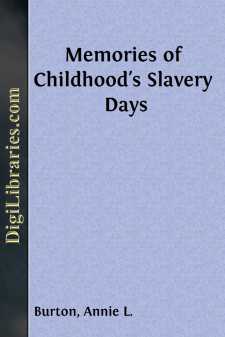Categories
- Antiques & Collectibles 13
- Architecture 36
- Art 48
- Bibles 22
- Biography & Autobiography 813
- Body, Mind & Spirit 142
- Business & Economics 28
- Children's Books 14
- Children's Fiction 11
- Computers 4
- Cooking 94
- Crafts & Hobbies 4
- Drama 346
- Education 46
- Family & Relationships 57
- Fiction 11829
- Games 19
- Gardening 17
- Health & Fitness 34
- History 1377
- House & Home 1
- Humor 147
- Juvenile Fiction 1873
- Juvenile Nonfiction 202
- Language Arts & Disciplines 88
- Law 16
- Literary Collections 686
- Literary Criticism 179
- Mathematics 13
- Medical 41
- Music 40
- Nature 179
- Non-Classifiable 1768
- Performing Arts 7
- Periodicals 1453
- Philosophy 64
- Photography 2
- Poetry 896
- Political Science 203
- Psychology 42
- Reference 154
- Religion 513
- Science 126
- Self-Help 84
- Social Science 81
- Sports & Recreation 34
- Study Aids 3
- Technology & Engineering 59
- Transportation 23
- Travel 463
- True Crime 29
Memories of Childhood's Slavery Days
by: Annie L. Burton
Categories:
Description:
Excerpt
RECOLLECTIONS OF A HAPPY LIFE
The memory of my happy, care-free childhood days on the plantation, with my little white and black companions, is often with me. Neither master nor mistress nor neighbors had time to bestow a thought upon us, for the great Civil War was raging. That great event in American history was a matter wholly outside the realm of our childish interests. Of course we heard our elders discuss the various events of the great struggle, but it meant nothing to us.
On the plantation there were ten white children and fourteen colored children. Our days were spent roaming about from plantation to plantation, not knowing or caring what things were going on in the great world outside our little realm. Planting time and harvest time were happy days for us. How often at the harvest time the planters discovered cornstalks missing from the ends of the rows, and blamed the crows! We were called the "little fairy devils." To the sweet potatoes and peanuts and sugar cane we also helped ourselves.
Those slaves that were not married served the food from the great house, and about half-past eleven they would send the older children with food to the workers in the fields. Of course, I followed, and before we got to the fields, we had eaten the food nearly all up. When the workers returned home they complained, and we were whipped.
The slaves got their allowance every Monday night of molasses, meat, corn meal, and a kind of flour called "dredgings" or "shorts." Perhaps this allowance would be gone before the next Monday night, in which case the slaves would steal hogs and chickens. Then would come the whipping-post. Master himself never whipped his slaves; this was left to the overseer.
We children had no supper, and only a little piece of bread or something of the kind in the morning. Our dishes consisted of one wooden bowl, and oyster shells were our spoons. This bowl served for about fifteen children, and often the dogs and the ducks and the peafowl had a dip in it. Sometimes we had buttermilk and bread in our bowl, sometimes greens or bones.
Our clothes were little homespun cotton slips, with short sleeves. I never knew what shoes were until I got big enough to earn them myself.
If a slave man and woman wished to marry, a party would be arranged some Saturday night among the slaves. The marriage ceremony consisted of the pair jumping over a stick. If no children were born within a year or so, the wife was sold.
At New Year's, if there was any debt or mortgage on the plantation, the extra slaves were taken to Clayton and sold at the court house. In this way families were separated.
When they were getting recruits for the war, we were allowed to go to Clayton to see the soldiers.
I remember, at the beginning of the war, two colored men were hung in Clayton; one, Cæsar King, for killing a blood hound and biting off an overseer's ear; the other, Dabney Madison, for the murder of his master. Dabney Madison's master was really shot by a man named Houston, who was infatuated with Madison's mistress, and who had hired Madison to make the bullets for him. Houston escaped after the deed, and the blame fell on Dabney Madison, as he was the only slave of his master and mistress. The clothes of the two victims were hung on two pine trees, and no colored person would touch them. Since I have grown up, I have seen the skeleton of one of these men in the office of a doctor in Clayton.
After the men were hung, the bones were put in an old deserted house. Somebody that cared for the bones used to put them in the sun in bright weather, and back in the house when it rained. Finally the bones disappeared, although the boxes that had contained them still remained.
At one time, when they were building barns on the plantation, one of the big boys got a little brandy and gave us children all a drink, enough to make us drunk. Four doctors were sent for, but nobody could tell what was the matter with us, except they thought we had eaten something poisonous....


